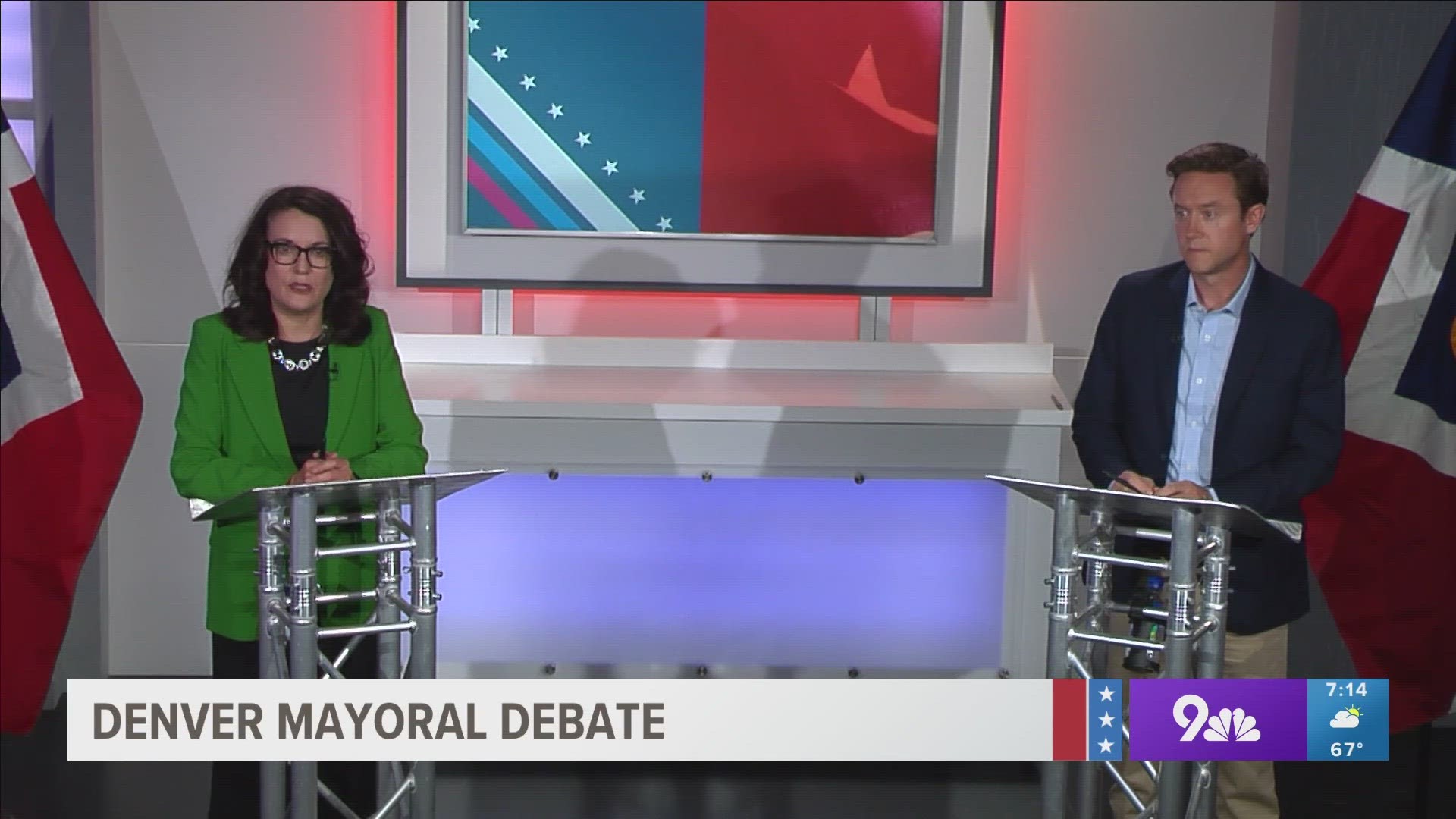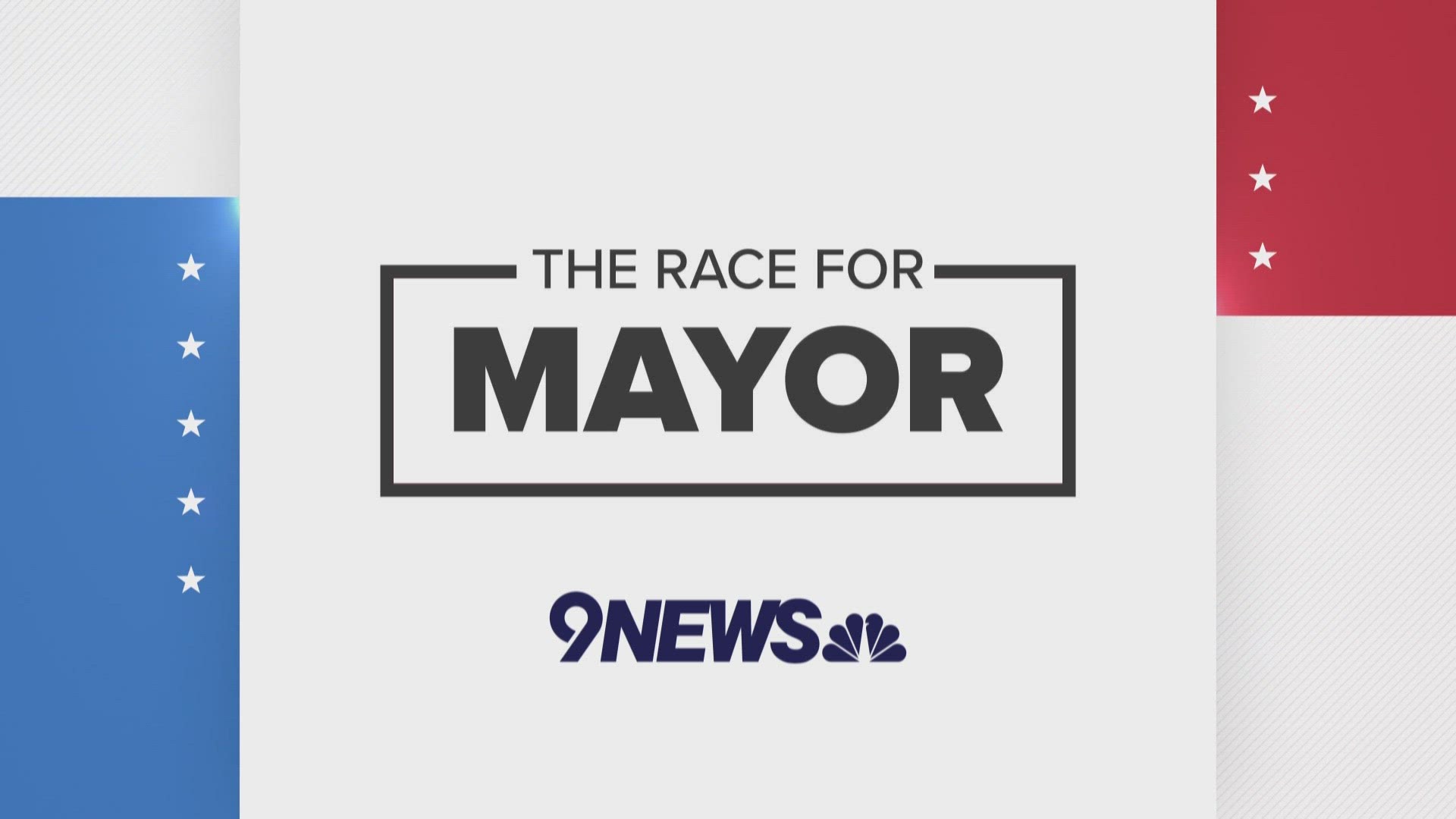DENVER — In the first round of voting, Denverites pared down a crowded field of mayoral candidates to two centrists with deep experience.
For Kelly Brough, it was at city hall and the Chamber of Commerce.
For Mike Johnston, it was in education, the state legislature and non-profit leadership.
Johnston took 24.5% of the vote in the original election last month, followed by Brough with 20%. Because no one candidate on the 16-person ballot secured 50% of the vote, the race went to a runoff.
Johnston and Brough met Tuesday for the last of 9NEWS' debates in the 2023 race before Election Day on June 6. 9NEWS' Kyle Clark, Marshall Zelinger and Anusha Roy moderated, asking the candidates about homelessness, housing, public safety and more.
Here are the highlights.
WATCH: Full mayoral debate
Schools
Neither candidate wants a mayoral takeover of Denver Public Schools (DPS), and both were specific about the policies they want to help protect kids after shootings in and around schools.
Both Brough and Johnston called for the school board to change the discipline policies that allow students accused of violent crimes including attempted murder to go back to class.
"We can both offer every kid a free and appropriate public education and not say that a kid who's been expelled from another school for a gun charge ought to be in a 3,000 student comprehensive high school where we have teachers every day trying to pat him down for a gun to make sure that they're safe," Johnston said.
"I think we can do both of those things and have kids who are at high risk both for their own protection, but also other kids to be in a safer location or in another school or learning in a different manner until they're stabilized or doing better or deemed to not be at risk to other kids," Brough said.
They also agree they're willing to have the city pay for school resource officers, a suggestion of the district's proposed safety policy. And they both said security measures might vary at different schools.
On the topic of the school board, both said who they don't want on the school board anymore -- School Board Vice President Auon'tai Anderson.
"I will support someone else with the community that restores confidence," Brough said.
"I believe he's lost the faith of the voters based on the leadership over the last several years," Johnston said.
Migrants
About 10,000 migrants have made their way through Denver since December. While officials say the majority will move on to another destination, current Mayor Michael Hancock has said it's putting financial pressure on the city.
Both candidates want Denver to remain a so-called "sanctuary city" but also hope for assistance on the regional, state and national levels.
They also want to find ways for migrants to be able to work while they apply for asylum.
Brough suggested migrants could be like contract workers, working legally without social security numbers.
Johnston suggested creating a public-private partnership with a staffing agency where migrants could work.
Homelessness
Brough explained why she believes Johnston's strategy to end homelessness in four years would be harmful for the people of Denver, describing gaps she sees in his plan.
As chief of staff for former Mayor John Hickenlooper, Brough had a front row seat for a mayor who made a pledge to end homelessness in 10 years.
"People are begging to get to a safer location," she said. "I think Mike's plan lacks a sense of urgency about getting people to safer locations and saving lives. I think it lacks a regional strategy, and I think this is a fundamental core to being successful and really starting to address this issue. I think tiny homes are just not a practical solution as the primary way to house."
Johnston vocalized that he doesn't want to wait for a regional agreement on homelessness, and rather start building tiny homes and micro-communities now. When asked where people experiencing homelessness will live before his suggested micro-communities are built, Johnston said discussions will begin on day one.
"Those include sites for tiny homes, those can include converted hotels, those can include outdoor spaces that are that are short term," Johnston said. "And as soon as we can site those, we can start moving people aggressively to those. And that's where we'll focus all of our energy. If we’re focusing on standing up that scale of housing across the city, which I think is what has not been done, then you have the capacity to actually not force people to move to allow people to move to the kind of shelter that they want, if we could offer it to them."
On Brough's objectives, Johnston took issue with his opponent's support for arresting people who are homeless -- an issue her campaign has gone back and forth on in the last few months.
"Your campaign has gone back and forth and back again on this issue of whether you have people on the street arrested if they refuse the city's offer of shelter. February 17, you said yes, you would. Three days later your campaign co-chair Denise Maes, formerly of the ACLU, said you would not. The very next day you said yes, you would. More recently, in April, your campaign co-chair again said you would not, and she said you've been consistent on this. There's nothing consistent about this at all," moderator Kyle Clark said.
"I was unaware of the inconsistencies you highlighted, but I do feel the campaign has been extremely consistent, or let me say I have been extremely consistent. It is a last resort. None of us, I do not want to criminalize anyone who's struggling with homelessness, but I also recognize there may be instances where to save someone's life, we may have to use the law," Brough replied.
Past work
Brough was asked about her leadership of the Denver Chamber of Commerce, where she pushed for conservative policies that were rejected by Denver voters. She opposed ballot issues on oil and gas setbacks, paid family leave, minimum wage and a progressive income tax to fund education.
Brough said sometimes she privately disagreed with the public positions she took on behalf of business interests.
Denver mayor runoff debate: Brough discusses her positions while leading Metro Chamber of Commerce
"The role I had was to represent an organization of 3,000 members and trying to reach consensus about really complex policy issues and the position they would take, honestly, I separated, you know, my personal view, even when I was trying to help drive toward that consensus or the approach we would take."
"The Chamber's not running for mayor, I am."
Johnston responded to questions about his own resumé, on which he references "leading" on issues like universal preschool, or winning against the National Rifle Association on the topic of large-capacity gun magazines despite a 2013 law going unenforced statewide.
"No one battle wins the war but you have to continue to stay at those day in and day out, especially when it’s an issue as complicated as guns," he said.
SUGGESTED VIDEOS: Full Episodes of Next with Kyle Clark


